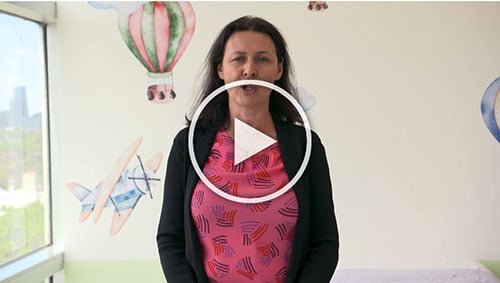WHAT IS BEDWETTING?
Bedwetting, also known as nocturnal enuresis, is when a child of five or older empties their bladder while they are asleep. This can happen every so often, or every night.
Bedwetting is common. About one in every five children in Australia wets the bed. Bedwetting can run in families. It is more common in boys than girls before the age of nine. It can be upsetting for the child and stressful for the whole family. The good news is that you can get help.
WHAT CAUSES BEDWETTING?
Wetting the bed is caused by a mix of three things:
- The body making a large amount of urine through the night.
- Having a bladder that can only store a small amount of urine at night.
- Not being able to fully wake up from sleep.
Children who wet the bed are not lazy or being naughty. Some illnesses are linked with bedwetting. But most children who wet the bed do not have major health problems.
Daytime control of the bladder comes before night-time dryness. Most children are dry through the day by three years and dry at night by school age. Any child may still wet every now and then, day or night, up until they are seven or eight years.
WHAT CAN PARENTS DO?
- Seek help from a health professional with special training in children’s bladder problems, such as a doctor, continence physiotherapist or continence nurse advisor.
- Make sure there is enough light at night. This makes it easy to get to the toilet.
- Watch for constipation as this can make bladder problems worse. Seek medical help if constipation is an ongoing problem.
- If your child is using a bedwetting alarm, you can help by:
- getting up when it goes off
- waking them up
- helping them change their clothes or sheets.
- Attend review appointments with your child's continence professional
There are some things which do not help:
- Do not punish the child for wet beds.
- Do not shame the child in front of friends or family.
- Do not lift the child at night to toilet them. This may cut down on some wet beds but it does not help the child learn to be dry.
- Do not try to fix bedwetting at a stressful time.
WHEN SHOULD YOU SEEK HELP FOR BEDWETTING?
It is best to seek help from a health professional with special training in children’s bladder problems. This might be your doctor, a continence physiotherapist or a continence nurse advisor. They can help children with their bedwetting from when the child is about six. Before this time, treatment may not be helpful.
However it is wise to seek help sooner, if the child:
- who has been dry suddenly starts wetting at night
- is wetting a lot after starting at school
- is bothered, upset or angry because of bedwetting wets or races to the toilet during the day.
Any child who is toilet trained and starts new daytime wetting should see a doctor. If the child has daytime symptoms as well as bedwetting, these will be treated before the bedwetting.
Many children do stop wetting in their own time with no help. After age eight or nine, if the child is still wetting often, the problem usually does not get better by itself.
CAN BLADDER CONTROL THROUGH THE DAY BE A PROBLEM?
Some children who wet the bed at night also have problems with how their bladder works during the day.
They may:
- go to the toilet too often
- not go to the toilet often enough need to rush to the toilet in a hurry have damp underwear
- have trouble emptying all of the urine from their bladder have bowel problems, including constipation.
WHAT ELSE CAN BE DONE FOR BEDWETTING?
There are many ways to treat bedwetting. A health professional may begin by checking the child for any physical causes. They will also check how their bladder works through the day.
Bedwetting alarms
These alarms are set to go off when the child’s bed or underwear is wet. Alarm treatment can still help, even if it was tried before and did not work. Sometimes alarm treatment is used with medicines as well.
Medicines
Some medicines help the bladder store more urine. Others reduce how much urine is produced overnight. One or more medicines can be used. Sometimes medicines are used with a bedwetting alarm. It may help to use medicines just for special times such as a sleepover. In some cases medicines are needed for some time.
SEEK HELP
You are not alone. Poor bladder and bowel control can be cured or better managed with the right treatment. If you do nothing, it might get worse.
Phone expert advisors on the National Continence Helpline for free:
- advice
- resources
- information about local services.
1800 33 00 66* (8am–8pm Monday to Friday AEST)
To arrange for an interpreter through the Translating and Interpreting Service (TIS National), phone 13 14 50 Monday to Friday and ask for the National Continence Helpline. Information in other languages is also available from continence.org.au/other-languages
For more information: continence.org.au, pelvicfloorfirst.org.au, health.gov.au/bladder-bowel
* Calls from mobiles are charged at applicable rates.
Bedwetting Videos
Kids Health Information : Bedwetting videos (rch.org.au) using a personal or bell and pad alarms


